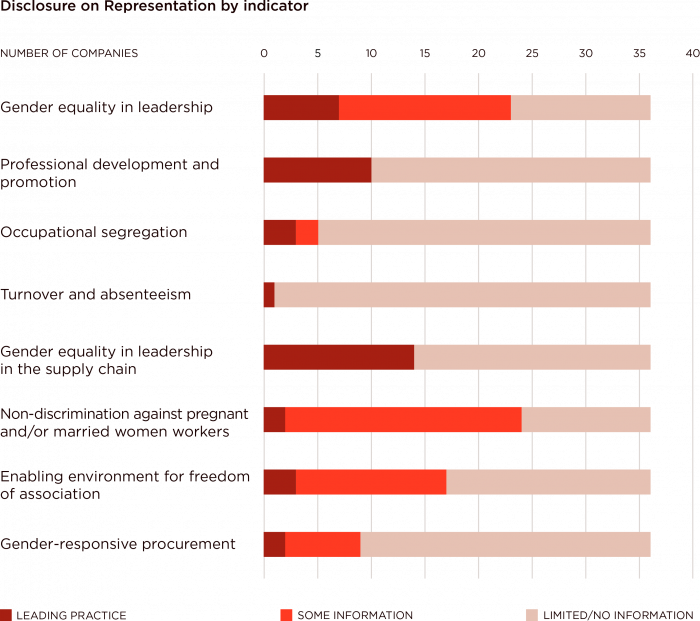Measurement area finding
Representation

Thirty-one companies (87%) disclose information on representation either in the workplace or the supply chain.
In the workplace, 23 companies (64%) disclose information on gender equality in leadership. Nearly all companies (34 companies, 94%) report on the gender composition of their board of directors, with the exception of the two privately held companies. However, fewer companies (23 companies, 64%) publish the gender breakdown of at least three levels of leadership with only seven companies (19%) reporting across all five levels. Information was found on professional development and promotion programmes from ten companies (28%). Only six companies (17%) disclose the gender breakdown by occupational function, and only one company publishes sex-disaggregated data on turnover. No company discloses absenteeism levels by gender breakdown.
In the supply chain, disclosure is focused on statements of non-discrimination against either pregnant or married women in the supply chain (24 companies, 67%). However, only one company requires its suppliers to offer training to hiring managers to ensure a non-biased approach to the recruitment and promotion of married and pregnant women workers. Fewer companies share information on either enabling freedom of association and collective bargaining in the supply chain (17 companies, 47%), female representation in leadership positions in the supply chain (14 companies, 39%), or gender-responsive procurement (9 companies, 25%).
11. Gender equality in leadership
Only seven companies (19%) publicly disclose the gender breakdown across all five levels of leadership: Ascena Retail Group, Costco, The Foschini Group, Gap, LVMH, Marks and Spencer Group, and Target.
Nearly all companies (34 companies, 94%) report on the gender composition on their board of directors, with the exception of Fung Group and Decathlon. Only eight companies reveal a gender-balanced board – between 40-60% women: Abercrombie & Fitch, Amazon, Ascena Retail Group, Gap, Kering, L Brands, LVMH, and Tailored Brands. Furthermore, two companies (Ascena Retail Group and Carter’s) report that their chairperson is a woman.
Nearly all companies (34 companies, 94%) publish the gender composition among senior executives, with seven companies reporting a gender balance: Abercrombie & Fitch, Associated British Foods, The Foschini Group, H&M, Levi’s, Lojas Renner, and Target. Two companies (Abercrombie & Fitch and H&M) report having a woman chief executive officer, while four companies (The Foschini Group, Heilan Group, Ralph Lauren and Souyute Group) report having a chief financial officer that is a woman. Gap is the only company that has a chief executive officer and a chief financial officer that are both women.
Fewer companies (14 companies, 39%) disclose information on the gender composition in senior management, with nine companies reporting a gender balance: Carter’s, The Foschini Group, Gap, Lojas Renner, LVMH, Marks and Spencer Group, Nike, Ralph Lauren and Target.
Similarly, 13 companies (36%) report on the gender composition in middle or other management positions, with only three companies revealing a gender balance: Kering, Target, and VF Corporation.
A majority of companies (23 companies, 64%) disclose information on the gender composition of their workforce, with nine companies reporting a gender balance: Abercrombie & Fitch, Adidas, Aditya Birla Fashion and Retail, Amazon, Associated British Foods, Costco, Decathlon, Nike, and VF Corporation.
12. Professional development and promotion
Ten companies (28%) have programmes to promote women in leadership positions: Adidas, Amazon, Associated British Foods, Fast Retailing, Kering, LVMH, Marks and Spencer Group, Nike, VF Corporation, and Walmart. However, no company provides the breakdown by gender of the percentage of employees promoted.
13. Occupational segregation
Five companies (14%) provide a gender breakdown of their workforce by at least three occupational functions: ANTA Sports Products, Costco, Lojas Renner, LVMH, and Target. Costco publishes the most detailed gender data of its workforce, including executives and senior officials, mid-level officials and managers, technicians, sales workers, administrative support, craft workers, operatives, laborers and services workers.
14. Turnover and absenteeism
Only one company (Inditex) discloses information to indicate that it tracks the annual turnover of employees by gender. However, no company discloses its absenteeism levels by gender.
15. Gender equality in leadership in the supply chain
Only one company (VF Corporation) requests that its suppliers collect data on the gender composition of their workers and operators. Though 13 companies (36%) indicate that they support their suppliers in offering professional development opportunities to women workers.
16. Non-discrimination against pregnant and/or married women workers in the supply chain
A majority of the companies (19 companies, 53%) require their suppliers to have strong statements or equal opportunities policies that do not allow for any discrimination against either pregnant or married women workers in the supply chain, six of which specifically prohibit pregnancy testing: Abercrombie & Fitch, Adidas, Amazon, Costco, Marks and Spencer Group, and Nike. Only Nike discloses that it requires suppliers to train hiring managers on their roles and responsibilities to implement and enforce the non-discrimination policy. Target is the only company to show how it supports suppliers to prevent discrimination by providing social compliance and responsible recruitment trainings.
17. Enabling environment for freedom of association and collective bargaining
While no company indicates that its suppliers are required to have recognition agreements with local trade unions, 22 companies (61%) explicitly recognize workers’ rights to freedom of association and collective bargaining and 17 companies (47%) require their suppliers to prohibit intimidation, harassment, retaliation and violence against trade union members. However, only three companies (Gap, Inditex and VF Corporation) report that they provide their suppliers support for workers to better understand these rights through trainings or workshops.
18. Gender responsive procurement
Seven companies (19%) have made a public commitment to gender-responsive procurement in their supply chain: Associated British Foods, Costco, The Foschini Group, L Brands, Ralph Lauren, Target and Walmart. Two companies (L-Brands and Walmart) disclose specific actions they take to support women-owned businesses, for instance by providing trainings, partnership and mentoring programmes. However, Walmart is the only company to disclose that it procures from women-owned businesses in its headquarter country and across all of its own operations.